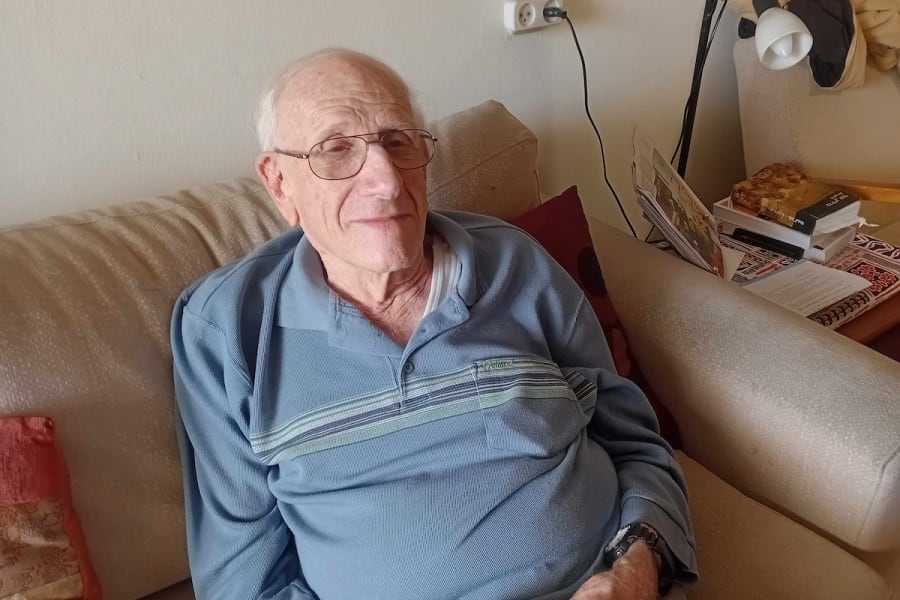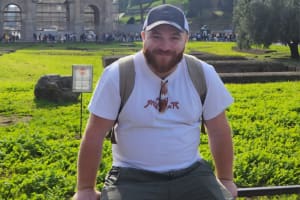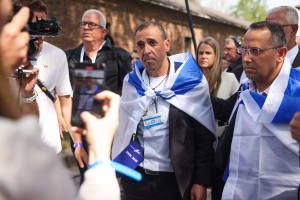Miraculous escapes: A German Jewish family’s survival against the odds in the Holocaust
Shaul Rothman shares with Paul Calvert his story survival and new life in Israel

Shaul Rothman and his mother survived the Holocaust, making it to Eretz Israel, and were reunited with Shaul’s father after five long years of separation.
Christian journalist Paul Calvert spoke with Rothman about his story of survival.
At 90 years old, Shaul Rothman can still recall the frightening events in Germany in 1938, his father’s arrest and suffering from a Nazi concentration camp, and the perilous journey he took with his mother on an old ship that sank off Haifa port before they were interned in a prison camp by the British authorities.
The story begins at Kristallnacht, the so-called ‘Night of the Broken Glass,’ when the Nazi regime left the German population no doubt as to its vicious Jew-hating policies, sending paramilitary forces to burn synagogues, attack Jewish businesses, assault and kill Jewish people and send around 30,000 men to concentration camps. It is known as the beginning of the Holocaust of six million Jews.
Rothman remembers that his father had made all the arrangements to go to Israel, then British Mandate Palestine, before Kristallnacht. That fateful night of Nov. 9, 1938, Rothman, then three or four years old, remembers that the Nazis “totally ruined” all the synagogues except one in Berlin, somehow saved by the Jewish community there.
“It was not ruined,” he said, “but it stood and people could come to pray there, [keep] Erev Shabbat and so on.” Rothman’s brother was a member of the choir in the synagogue until he escaped to London. His father continued to bravely attend services until he was captured by the Nazis.
The family became separated, Rothman explained. “My father was in a concentration camp. My brother – nearly 15 years old – was in England. And I stayed with my mother.”
Miraculously, Rothman’s father was released from the Nazi camp, thanks to the efforts of his wife in obtaining a certificate from the British consul. The condition of release was that Rothman senior must leave Germany within two weeks.
“My father lost 30 kilos,” Rothman explained. “We hardly recognized him. If people in three months, or something like that, [lose] such an amount of kilos...” But his father could not take time to recover from the forced labor, abuse and starvation, aside from resting for a few days.
Being under pressure to leave the country, Rothman senior managed to contact the Jewish resistance. He was advised to flee to Slovakia, where several hundred refugees were gathering to take a boat to Israel.
“Unfortunately, it was a very old ship, and it was constructed in the 19th Century, and they had many problems to prepare it for these people,” said Rothman.
Along the River Danube, the old ship was captured, he thought by Bulgaria, and remembers the Jewish resistance leadership stepping in, with the help of other countries, until the ship was released.
“And I saw my father waving with both hands,” Rothman recalls. “I recognized him, and I thought that it [would be] the last time I see my father.”
Rothman described how his father’s life was again saved in Italy. His ship had halted at one of the small, uninhabited Grecian islands, where the refugees went ashore and fended for themselves for 13 days, making fires by night. They were then spotted by the Italian air force and taken to a refugee camp on the island of Rhodes.
Rothman senior was able to demonstrate his craftmanship there, and made a “very nice” leather handbag, greatly impressing the governor of the island, who suggested the Jewish refugee stay on Rhodes, offering him a job.
However, Rothman senior was responsible for the Jewish refugees from Germany, so he politely declined the offer, saying, in his son’s words, “I have here 400 people and I am responsible for them and I go with them.”
“And that was the best decision for him,” Rothman explained, “because half a year later, the Nazis came to the Isle of Rhodes and killed all the Jews in a football place. And so he was saved.”
Then a third time, the father’s life was saved, and by the pope, no less. Pope Pius XII “was not very pro-Israeli or pro-Jewish,” Rothman admitted, but “my father used to say, ‘He saved my life!’”
Rothman senior was in a camp in Ferramonti, near the southern tip of Italy. And an agreement was made with the Germans to send the Jews there to an extermination camp in Poland, Rothman explained. However, the pope intervened and insisted the refugees remain in Italy.
When southern Italy was invaded by the British Army in July 1944, they found this camp, which had grown to thousands of people, Jews and non-Jews. At the end of the war, the group of 400 Jewish refugees were able to travel to Egypt, and then by train to Atlit, the British detention camp on the coast of Israel, then still under the British Mandate.
By this time, the young Rothman was living with his mother in Rehovot. He said that he had finished school for the day, and he remembers that it was around July 14, or 17, 1945, and it was a Friday. The train his father was on actually passed through Rehovot, on its way to Atlit, but neither Rothman nor his mother knew who was on the train.
“So we went to the train station in Rehovot to see [the refugees], and they said the train will not stop in Rehovot. So I left,” Rothman recalls. “I didn’t know that it’s my father in there.”
The next day, the Sabbath, Rothman, now around 10 years old, went to Atlit with his mother. Just as he had seen his father waving from the old ship in the Danube, five years prior, they again saw their beloved father and husband, about 500 meters away, waving to them from inside the camp.
Thankfully, Rothman senior was released from Atlit after about a week, since he had applied to enter Israel so many years previously. “And that's how I met my father after five years,” said his son.
Rothman and his mother had arrived in Haifa on another ship, back in November 1940. They also had a miraculous escape or two.
“We escaped from Germany because of a policeman, a German policeman, who was anti-Nazi,” Rothman explained. “And he helped us in several actions when we needed help. Most of the people who helped us were not Jews.”
Rothman remembered that there was a non-Jewish shop where the owners allowed them to buy food, even though, as German Jews, they did not have the necessary government food coupons.
“So we got everything we needed,” he said. “And when it was not necessary to go to his shop, we phoned him – in those days we had the telephone - and he delivered it. Anyhow, we survived.”
Rothman’s mother heard about the Jewish resistance organizing the clandestine ships taking Jews out of Europe, to save their lives. “They said to her, listen, we know you and you know how your husband was helpful, but we don't take children.
“Anyhow, this policeman [who] helped Jews… he went to the Jewish Agency. And he said, ‘I promised Mr. Rothman that his wife with the first ship [would be] going to Palestine.’ And he shouted at them, and they were afraid… and they accepted me. We were a few children from Germany who joined our ship.”
Like many thousands of Jews fleeing the Holocaust, the Rothmans suddenly had a notice to be ready quickly and go to Vienna.
The six-year-old in the carriage of the train, with his mother, knew by that young age not to trust anyone. He describes how a captain from the German army came into their compartment.
“He wanted to be nice to me and spoke with me and asked me [to] what school I went,” Rothman recalled. “I knew that I shouldn’t say [it was] Jewish.” Not saying a word, mother came to the rescue and said the little boy was shy, and so again the pair continued unscathed.
“I was afraid because he was not a policeman, but you never know what can be there,” Rothman said. “Anyhow, we arrived in Vienna. I was six and a half years old. We were there less than three weeks, and we entered boats which took tourists to Vienna…”
His mother had very little money, but they were allowed to buy street food, and Rothman remembers they bought corn on the cob.
There were three boats, and they were sent to one which was “nearly full,” Rothman one of a handful of children. He remembers sleeping on shelves, one above the other. When one person rolled over, everybody else had to roll over as well, he said. They were there for months in these cramped conditions.
“But it was nice because it was near an entrance where cool air entered, because those who were underneath us, they suffered,” Rothman said. “And for me, it was nice that I could get up and go to the deck. So I spent many times on the deck where people were working, and they had bowls, filled them with sea water and helped you wash your hands, and so on.”
The little boy had a real fright on one occasion, when the ship began to sink. The refugees would try to amuse themselves by having performances on the deck, the audience on one side and the performers on the other. Since the audience was so much bigger, that side began to sink. The captain shouted for the people to move to the other side, “so the ship didn't sink, but I was in a panic,” he recalled.
After a stormy time in the Black Sea, the ship reached Haifa on Nov. 1, 1940. The British wouldn’t allow many of the Jewish Holocaust survivors to enter Israel, because of government-imposed quotas as a result of the fateful 1939 White Paper.
The British soldiers transferred the Rothmans and over 200 others on to the SS Patria ship, with the aim of transporting them to the southern part of Africa to imprison them on the island of Mauritius.
And then tragedy struck. The pre-state Jewish defender army, the Haganah, in order to resist the British policy, had placed a bomb into the machinery of the boat, but it was bigger than the engineer’s order, Rothman explained.
“They had nobody with the experience to know exactly the quantities of this material,” he said. “We were on the deck because they said that it was Friday, and they had some announcements for us. And then at about 9:30, there was an explosion and the ship was sinking.
“And I didn’t like crowds, so I took my mother and said, ‘Let’s go there,’” Rothman recalled. There were offices above the deck and they moved upwards instead of running with all the people who were pushing in panic. “And we went in this, it was not allowed for the Jews to go there, but it was empty. The ship turned on its side… we could see the sky. I started shouting in German, ‘Rescue the child!’”
Rothman described how a worker on the ship, who was from the Far East, tried to rescue them as quickly as he could, since the Patria sank in 15 minutes, and over 250 Jewish refugees drowned.
“One of the workers reached a hand to me and lifted me up. And I stayed outside on the wall of the ship and then he started to rescue my mother. And my mother is not tall as I am. And he was not tall. He was from the Far East, and he couldn’t reach her. And he tried once and twice and three times, and he reached part of her hand. But it wasn’t enough to lift her, although she wasn’t a fat woman.”
At the same time, the little boy was holding on to the man’s feet. “I didn’t let him go, which is obvious. I lost my father. I lost my brother. And now I’m losing my mother. So I didn’t let him go. But then he tried again and succeeded to lift her up.”
So both mother and son were saved, yet again. Rothman remembers that the British prepared sausage sandwiches and tea with milk, and they were a kosher-observant family. “But my mother said, ‘You have to eat.’ My mother did not.”
The pair and other survivors were taken to the Atlit detention camp, where they stayed about seven and a half months. His mother refused to let Rothman go to the men’s side of the camp, so he remained with all the ladies, although the British tried to separate them. He learned Hebrew by studying on the men’s side during the daytimes.
Rothman had an uncle near Rechovot, and his mother got a job in Gedera, where she could speak German, since she didn’t know Hebrew. Rothman said “it was difficult” for him going to first grade at over seven years-old, but he was determined to speak only Hebrew, except to his mother.
Once the family was reunited, they found an apartment in Sha'arayim, where many Yemenite Jews were living. Rothman senior opened a shop in Rechovot, and young Shaul liked to read the newspapers leftover from the neighbors, since his parents could not afford to buy them.
“I was very young when I started reading, not [material] for children,” he said. “My mother used to pay for it! I was very interested in all that was going on during the war. And I had maps and I searched wherever I could because when I came to Israel, I was in fear that the Germans are following us.”
Since the Italian forces were in the north and the Germans had been in Egypt and conquered northern Africa, the young Rothman was afraid that the Nazis would reach Israel and hunt them down.
When Israel’s Independence Day arrived, the resilient family celebrated in the center of Rechovot, where his father had his tiny leather bag shop, just in the entrance to a building. Rothman said that people could choose between leather shoes or bags for their children, and everyone opted for shoes.
Nevertheless, after the perils of the Holocaust and the long, dangerous journey home, he admitted, “My father was very proud.”
Click below to listen to the full interview.

The All Israel News Staff is a team of journalists in Israel.
You might also like to read this:
















